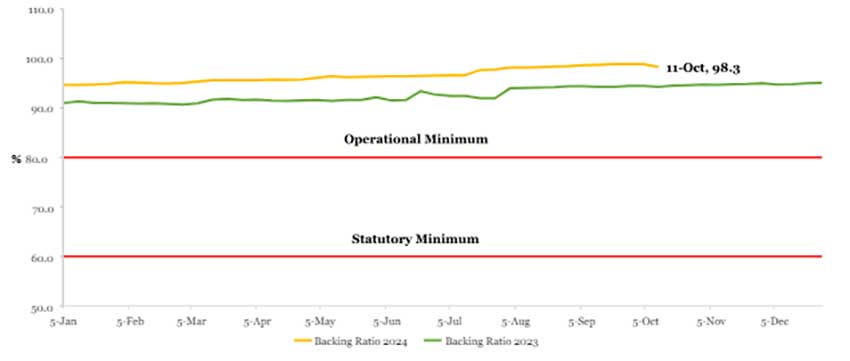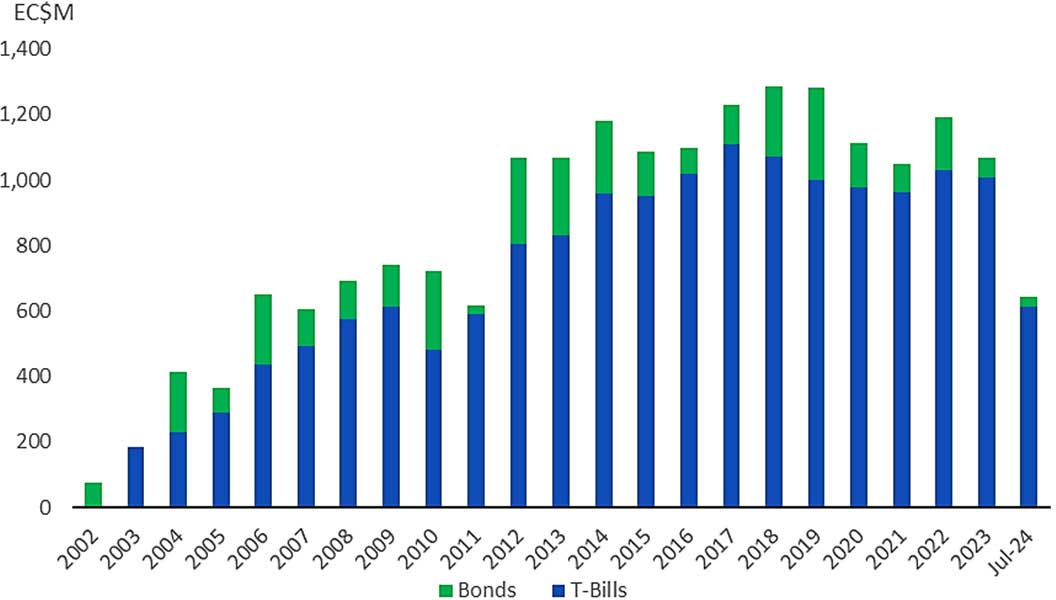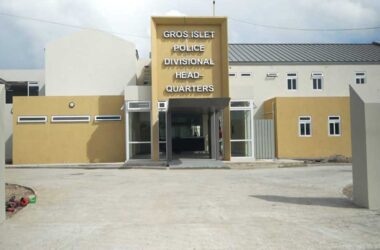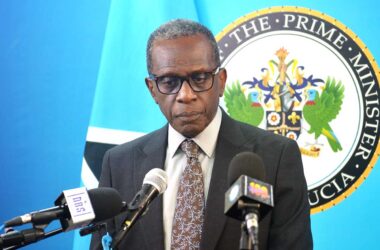Issued: 18 October 2024
The One Hundred and Ninth (109th) Meeting of the Monetary Council of the Eastern Caribbean Central Bank (ECCB) was held virtually on 18 October 2024.
1.0 Monetary Stability
The Monetary Council received the Governor’s Report on Monetary, Credit and Financial Conditions in the Eastern Caribbean Currency Union (ECCU). The Report, titled The Big Push: Pursuing Bold Actions for Transformation provided global and ECCU updates on monetary, credit and financial conditions for the first three quarters of the year and assessed their potential impact in the near to medium term. The Governor’s Report indicated that:
- Both international and regional growth has remained markedly resilient, with economic expansion in the ECCU continuing to be underpinned by tourism and construction activity.
- The global economy is expected to remain stable and resilient despite adverse economic challenges such as strong geopolitical tensions.
- Major central banks have commenced cutting interest rates, an indication that inflation has abated and is converging to target. ECCU inflation, which is mostly imported and tracks US inflation, has eased significantly from 9.5 per cent in 2022 to 2.2 per cent in 2023 and 1.9 per cent as at June 2024.
- The above average 2024 Atlantic hurricane season is one of the most significant downside risks for ECCU economies. This was thrown into sharp relief by the destructive passage of Hurricane Beryl in Grenada and Saint Vincent and the Grenadines in July.
The EC currency remains strong with the backing ratio, or the ratio of foreign assets to demand liabilities, at 98.3 per cent (as at 11 October). This is far above the statutory minimum requirement of 60.0 per cent. Reserves amount to EC$5.4 billion.
Weekly Backing Ratio

- Having considered the state of monetary, financial and credit conditions in the ECCU, and on the recommendation of the Governor, the Monetary Council agreed to:
- Maintain the Minimum Savings Rate at 2.0 per cent; and
- Maintain the discount rate at 3.0 per cent for short-term credit and 4.5 per cent for long-term credit.
Almost one year ago at its 106th Meeting held in November 2023, the Monetary Council increased the Central Bank’s discount rate by 100 basis points (1.0 percentage point) from 2.0 per cent to 3.0 per cent for short-term credit, and from 3.5 per cent to 4.5 per cent for long-term credit. Those were the first rate hikes since the short-term and long-term rates were lowered in April 2020 and February 2021, respectively.
The Minimum Savings Rate is the lowest rate that commercial banks can offer on savings deposits. The Central Bank’s discount rate is the rate at which the ECCB lends to governments and commercial banks.
2.0 Financial Stability
The Monetary Council was advised of the following developments in the ECCU financial sector:
- The ECCU banking system remains resilient and stable, with a high degree of liquidity conducive to the overall growth and development of the region.
- Given the ongoing strong growth in money supply, interest rates are anticipated to stay low for the immediate term and even over the medium term.
- Profitability has improved. Moreover, growth in consumer lending — particularly for private residential mortgages, home construction and durable goods— is providing an impetus for construction sector activity and increased consumer expenditure.
- Banks are generally well capitalised. Deposits continue to grow, including from businesses.
In support of financial stability, the Monetary Council considered and approved the following:
- The proposed design for the Eastern Caribbean Financial Standard Board (ECFSB). The ECFSB will form part of the Eastern Caribbean System of Financial Supervision, which includes the ECCB. The ECFSB’s purview will focus on market conduct, AML/CFT and consumer protection compliance. It will regulate: insurance and pensions (onshore and offshore); deposit-taking non-bank financial institutions (NBFIs), such as credit unions, building societies, and development banks; Money Services Businesses (MSBs); and offshore banks, trusts and mutual funds. ECFSB’s target operational date is the fourth quarter of 2026 once the required legislation is passed by all ECCU Member Governments by September of that year.
- The Amendment to Article 66(1) of the Eastern Caribbean Asset Management Corporation (ECAMC) Agreement. The Agreement is the legislative framework that provides ECAMC with a clear mandate to support financial stability within the region. The Amendment to Article 66(1) dealt with the selection and retention of ECAMC Directors, as well as their length of tenure, thereby ensuring continuity of leadership while maintaining good governance.
3.0 Fiscal and Debt Sustainability
Fiscal performance continues to improve in tandem with economic recovery. The Regional Government Securities Market (RGSM) — a key source of public sector financing — continues to show a promising growth trajectory. Investment activity steadily increased in the first seven months of 2024. As at the end of July 2024, ECCU Member Governments have raised a total of EC$19.4b on the RGSM since its inception in November 2002.
Funds Raised by Instrument Type

4.0 Growth and Competitiveness
Economic prospects for the ECCU are broadly positive, and the pace of economic activity is expected to accelerate in 2024 and currently projected around 5 per cent.
Growth in the ECCU continues to be propelled by tourism and domestic-related construction activity. The construction sector is being buoyed by home construction, which has benefitted from increased credit to households. However, construction activity related to foreign direct investment (FDI) remains depressed.
Several structural issues need to be addressed to further unlock the ECCU’s growth potential. These include: high indebtedness, skills deficits, rising homicide rates, climate vulnerability, as well as competitiveness and productivity challenges.
5.0 Financial Inclusion
The Monetary Council noted the update on the closure of the DCash Pilot Project and preparatory work towards procurement of a commercial-grade retail central bank digital currency solution (DCash 2.0). The DCash Pilot Project closed, effective 12 January 2024. In the fourth quarter of 2024, a survey of a random sample of the ECCU public will be done to guide the way forward. A website relaunch is also expected to take place in the fourth quarter of 2024.
Council also considered and approved the proposed structure of the Office of Financial Conduct and Inclusion (OFCI). The OFCI will be established as a department of the Eastern Caribbean Central Bank. The new department will focus on four (4) work streams, namely: regulation and policy development; complaints handling and alternate dispute resolution; conducting off-site and on-site supervision; and financial literacy, to assist in developing and coordinating financial education and empowerment programmes across the ECCU. Its target operational date is the fourth quarter of 2025 once the required legislation is passed by all ECCU Member Governments by September of that year.
6.0 Change of Queen’s Image on Eastern Caribbean Currency
Council noted that the redesigned EC$100 banknote could enter circulation by late 2027, with the $5, $10, $20 and $50 banknotes being released at later dates as current stocks are depleted. Each denomination will feature dual portraits of two notable ECCU nationals. Ten prominent regional figures in all will be featured on the redesigned banknotes.
7.0 Update on the Greening the Financial System (GFS) Initiative
Council was updated on the progress of the implementation of the planned regional Renewable Energy Infrastructure Investment Facility (REIIF) project. The REIIF falls under the ECCB’s Greening the Financial System (GFS) initiative.
Council noted that the project planning and preparation activities are progressing apace, with the aim of operationalising the REIIF in 2025. This will occur in two phases, starting with an initial rollout in Grenada, Saint Lucia, and Saint Vincent and the Grenadines. The REIIF is expected to bring a three-fold increase in clean power generation capacity in the ECCU by 2030.
8.0 Report received on ECAMC
Council considered and noted the Report on the status of the operations of the Eastern Caribbean Asset Management Corporation (ECAMC) from 01 April 2023 to 30 June 2024, including ECAMC’s Management Accounts as at 30 June 2024.
9.0 Report received on ECPCGC
Council considered and noted the Report on the status of the operations of the Eastern Caribbean Partial Credit Guarantee Corporation (ECPCGC).
10.0 Date and Venue of the 110th Meeting of the Monetary Council
Council agreed to the convening, in person, of the 110th Meeting of the Monetary Council on Friday, 14 February 2025 at 9:00 a.m. It will be held at the Eastern Caribbean Central Bank in Saint Christopher (St Kitts) and Nevis.
11.0 Participation
Council Members attending the meeting were:
- The Honourable Dr Ellis L Webster, Premier and Minister for Finance, Anguilla (Chairman)
- The Honourable Gaston Browne, Prime Minister and Minister for Finance, Antigua and Barbuda
- The Honourable Dennis Cornwall, Minister for Finance, Grenada
- The Honourable Philip J Pierre, Prime Minister and Minister for Finance, Saint Lucia
- The Honourable Camillo Gonsalves, Minister for Finance, Saint Vincent and The Grenadines




![John Paul Estephane, Minister in the Ministry of Tourism and Commerce [Photo Credit: GOSL]](https://thevoiceslu.com/wp-content/uploads/2026/01/John-Paul-Estephane-380x250.jpg)

![DIPT-RESDP SAP graduating class [Photo credit : GOSL]](https://thevoiceslu.com/wp-content/uploads/2026/01/DIPT-RESDP-SAP-graduating-class-1-380x250.jpg)






